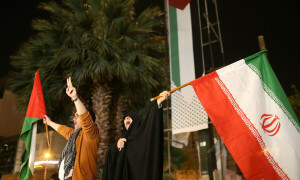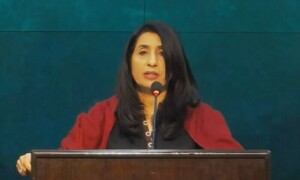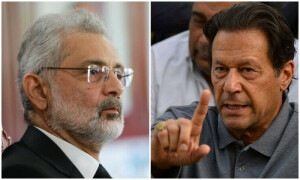MUSIC has, of course, been described as a mathematical equation, a creation and an endeavour that is precise — absolutely perfectly calculated, if you will — if it is to work and endure. But also, as not enough people understand it, it can be a dialogue, a speech, a diatribe — and yes, I’m stating the perfectly obvious.
A couple of weeks ago, on these pages was discussed the age-old debate of whether song lyrics were counted as poetry, a debate that was fairly conclusively put to rest in 2017 when the Nobel Prize for Literature went to Bob Dylan. The question, though is, does the poetry come first or the music? How does that magical melding work that builds and transforms?
Consider, for example, Allama Iqbal’s absolutely beautiful poem on the Mosque of Cordoba; unmatchable though it is, a portion was immortalised even further as the song Silsilae roz-o-Shab in the duet between Malika Pukhraj and Tahira Syed (poetry that in this day in this country might be considered worthy of approbation, him being our national poet notwithstanding — consider Shikwah, Jawab-i-Shikwah). In setting the poetry to music, the professionals created an entity that goes beyond. The dialogue between the mature voice lamenting the progression of life, and a degree of cynicism, and the younger voice replying in hope and belief, is fairly unmatched. The point is that what was already beautiful — glorious — was rendered even further so. (Aside: since I am rather partial to Malika Pukhraj’s work, another absolute gem is Mujhe yaad karne walo, in addition to so many others.)
Music also speaks a dialogue of its own.
As a thought experiment, from here it is possible to cross towards the idea that music also speaks a dialogue of its own, not actually or necessarily requiring words and language. This is, of course, an age-old concept, and there is only a plethora of examples from around the world, through the ages. Beethoven’s Ode to Joy, or Dmitri Shostakovich’s Waltz No. 2, or Itzhak Perlman’s Tango, or Maurice Ravel’s Bolero, spring immediately to my mind, at least (but everyone has their own preferences, obviously — a hundred, several thousand from around the world, more could be referred to).
Inspiration breeds inspiration. Consider, for example, the rather wonderful fact that the Bollywood song Dil to Bacha hai Ji, picturised so memorably on the inimitable Naseeruddin Shah in the film Ishqiya is, essentially, the Bolero. The cadence is compelling, and the songwriter’s lament about love or infatuation in older years — irresistible, yet pointless, in the context of the movie — no less so. Meanwhile, the song creates bridges across continents, cultures, and the ages, to which many of us, multilingual and cross-cultural as we are, can heed.
Going on from there, music in the dialogue form has taken so many shapes. Pink Floyd are often taken as having come up with the idea of a concept album, where the music/songs are not single-standing entities but a unified whole that is self-reliant and speaks in and of itself. The albums Dark Side of the Moon and more famously The Wall were path-breakers in their own way, and set a bar for many others to follow, such as Prince, or Eminem.
Musicology is an academic discipline because of a reason. Greats across the ages have spent their life’s blood, and produced inspiration that has seared so many a soul. Lest one get confused, though, one must underline the distinction that actually, there is really not much distinction in this field in terms of ‘high brow’ or otherwise. In an interview with Rolling Stone magazine some years ago, vocalist and guitarist Arlo Guthrie — who rendered the classic Alice’s Restaurant — talked about how his father told him, learn to play an instrument and learn music: it will be your friend in life. His lovely song has endured now for over half a century, though not played that often (given that it refers to the Vietnam War). But lest the reader bridle, the world has not yet forgotten The Beatles, or Elvis, or Tan Sen.
As written earlier, inspiration comes from so many directions. In a random trawl, join this to the work on someone such as Australian film director Baz Luhrmann, who has often talked about being inspired in his professional life by the music and spectacle of Bollywood — showcased in the fairly spectacular 2001 Moulin Rouge. While being in English, of course, it draws upon tropes that anyone from this part of the world is well familiar with, circularity and all (in cinematic terms).
And so, to the title of this piece. ‘Little Boxes’ is a song by Malvina Reynolds (d: 1978), American blues / jazz songwriter, singer, guitarist and political activist. This particular gem was revitalised when employed as the title theme of the show Weeds, centring on a woman’s determined suburban existence and need to keep the family going after her husband’s death.
The music, as said often, is magic.
The writer is a member of staff.
Published in Dawn, December 30th, 2019













































